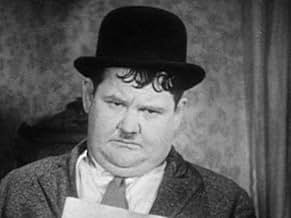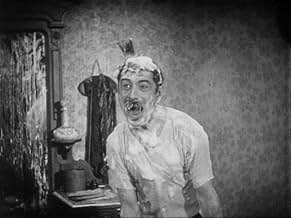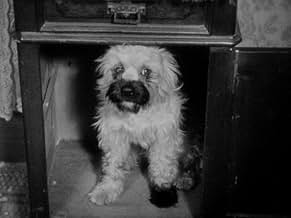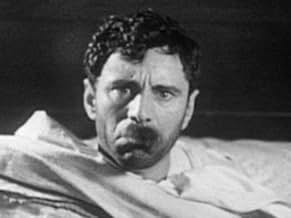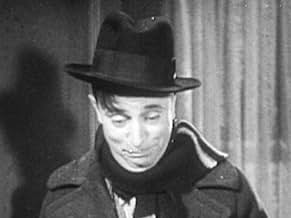Stan and Ollie try to hide their pet dog Laughing Gravy from their exasperated, mean tempered landlord, who has a "No Pets" policy.Stan and Ollie try to hide their pet dog Laughing Gravy from their exasperated, mean tempered landlord, who has a "No Pets" policy.Stan and Ollie try to hide their pet dog Laughing Gravy from their exasperated, mean tempered landlord, who has a "No Pets" policy.
Harry Bernard
- Policeman
- (uncredited)
Charles Dorety
- Drunk
- (uncredited)
Laughing Gravy
- Laughing Gravy - the Dog
- (uncredited)
Charlie Hall
- Landlord
- (uncredited)
- Director
- Writer
- All cast & crew
- Production, box office & more at IMDbPro
Featured reviews
Laurel and Hardy sneak their dog, Laughing Gravy, into their room, despite the 'no pets' policy of landlord Charlie Hall.
The Boys seem to have been fond of the movie they could make about pets in boarding houses. They had already done ANGORA LOVE with a goat as their last silent movie, and would make THE CHIMP later, as well as dealing with gorillas, elephants, and Oxford undergraduates in their features. Here, they've got to deal not only with a desprately cold night, but Charlie Hall, like Stan, a graduate of the Fred Karno troupe.
The Boys seem to have been fond of the movie they could make about pets in boarding houses. They had already done ANGORA LOVE with a goat as their last silent movie, and would make THE CHIMP later, as well as dealing with gorillas, elephants, and Oxford undergraduates in their features. Here, they've got to deal not only with a desprately cold night, but Charlie Hall, like Stan, a graduate of the Fred Karno troupe.
The humor of Laughing Gravy operates on the premises that 99% of the audience are pet lovers. Therefore anything that Stan and Ollie do to keep their little pooch Laughing Gravy from being tossed out to the elements of winter is absolutely justified. Even if landlord Charlie Hall has a no pet rule in his establishment.
And so most of the film is spent with them trying to get the little guy past the watchful eye of Hall. Remember this is the dead of winter with snow falling on the ground. Best moment in the film is poor Ollie in his nightshirt falling into a rain barrel partly frozen over. I get susceptible to pneumonia just looking at him.
The last part of the film also has Laurel getting $1000.00 inheritance from his uncle providing he severs all connection with Oliver Hardy who has held him back for years. Funny thing is that those are precisely the words Ollie said about Stan.
The World Court in The Hague would have a problem deciding on the merits of counter lawsuit has to who held back who. You be your own judge.
Stan and Ollie do prove that friendship can survive a lot.
And so most of the film is spent with them trying to get the little guy past the watchful eye of Hall. Remember this is the dead of winter with snow falling on the ground. Best moment in the film is poor Ollie in his nightshirt falling into a rain barrel partly frozen over. I get susceptible to pneumonia just looking at him.
The last part of the film also has Laurel getting $1000.00 inheritance from his uncle providing he severs all connection with Oliver Hardy who has held him back for years. Funny thing is that those are precisely the words Ollie said about Stan.
The World Court in The Hague would have a problem deciding on the merits of counter lawsuit has to who held back who. You be your own judge.
Stan and Ollie do prove that friendship can survive a lot.
The boys rent an apartment from Charley Hall, who always seems to be angry. They take in a dog and call him Laughing Gravy. Of course, there is a "no dogs allowed" policy in the place and this puts the crabby landlord to the test. Stan and Ollie try so hard to keep the dog without disturbing the landlord (actually without letting on that the dog is there). This leads to incredible physical demands on the two guys, who even end up on the roof at one time. It's touching to see how much they care, but they are not very wise in their choices of action. This is another one of those episodes which are shown over and over. I guess there are lots of dog lovers.
LAUGHING GRAVY
Aspect ratio: 1.37:1
Sound format: Mono
(Black and white - Short film)
During a heavy blizzard, boarding-house tenants Stan 'n' Ollie hide their dog from an unsympathetic landlord (Charley Hall) who threatens to evict them if they don't follow the rules. Chaos ensues...
Archetypal L&H comedy, played and filmed to perfection, as the boys' efforts to protect 'Laughing Gravy' meet with disaster at every turn. Ollie's attempts to get back into the house without being noticed by the sleeping landlord is only one of the film's many highlights, leading to a precarious rooftop episode (!) and a series of blunders and disasters. Fine comic timing, excellent set-pieces, great fun. Directed with typical gusto by L&H regular James W. Horne.
The film exists in three separate versions: It played theatrically as a two-reeler, following the elimination of a third reel in which Stan comes into an unexpected inheritance. This material has since been restored to a second version which omits the original's ending. A third edition - which appears to exist only in colorized form - contains ALL extant material, including the inheritance AND the original ending.
Aspect ratio: 1.37:1
Sound format: Mono
(Black and white - Short film)
During a heavy blizzard, boarding-house tenants Stan 'n' Ollie hide their dog from an unsympathetic landlord (Charley Hall) who threatens to evict them if they don't follow the rules. Chaos ensues...
Archetypal L&H comedy, played and filmed to perfection, as the boys' efforts to protect 'Laughing Gravy' meet with disaster at every turn. Ollie's attempts to get back into the house without being noticed by the sleeping landlord is only one of the film's many highlights, leading to a precarious rooftop episode (!) and a series of blunders and disasters. Fine comic timing, excellent set-pieces, great fun. Directed with typical gusto by L&H regular James W. Horne.
The film exists in three separate versions: It played theatrically as a two-reeler, following the elimination of a third reel in which Stan comes into an unexpected inheritance. This material has since been restored to a second version which omits the original's ending. A third edition - which appears to exist only in colorized form - contains ALL extant material, including the inheritance AND the original ending.
Abbott and Costello, Bob Hope and Bing Crosby, Dean Martin and Jerry Lewis, Morecambe and Wise, The Two Ronnies, Pete and Dud a.k.a. Derek and Clive, The Blues Brothers, Matt Lucas and David Walliams etc, etc these are just a tiny percentage of comedy double act's, the comedy duo's, that throughout the age's have entertained us all. Each with their own twist and turn of a gimmick that set's them apart, but in the final solution following, at times, the tradition of smart-aleck and buffoon.
However, there is just one pair that set themselves very much apart from the herd, originators and comic geniuses that no one has surpassed, surpassed by either skill, wit and personality the late, great Laurel and Hardy, British born Stan Laurel (1890 - 1965) and his American counterpart Oliver Hardy (1892 - 1957).
Their first outings were of the short silent movie variety, consisting of at least two reels in length, a reel being often around ten minutes long, this first short together was to be Slipping Wives (1927). Their first talkie was Unaccustomed As We Are in 1929, the advantage that both Laurel and Hardy had over most of their silent movie companions were that they adapted very well to this new genre. The Music Box (1932) won them an Academy Award for best short film, their only such Award.
Yet again, the famous Hal Roach Studios had a part in the making of Laughing Gravy, along with the writing credits to H.M. Walker (1885 - 1937) who with a vast order of merit as writer of dialogue and title creator for works for many of the silent, and not so silent, era's shorts. A snippet of Laurel and Hardy titles that includes Night Owls, Another Fine Mess, Below Zero, Brats and Our Wife. Directed too by one James W. Horne (1880 - 1942) whose career started out as actor way back in 1913, then progressed to writer then director of many, many shorts and full-length movies.
Then what about poor Laughing Gravy? Well, he, or more be it to the point she, went on to work with Laurel and Hardy twice more in Pardon Us (1931) and The Bohemian Girl (1936) as well as working in other Hal Roach (1892 - 1992) productions.
Laughing Gravy was filmed between the 2nd and 18th of February 1931 and released April 4th of the same year, and it is here, in this studio setting, we find this enduring duo shacked up in lodgings, one dark cold winter, and of course with their tiny pet dog Laughing Gravy, who has been sneaked into said bed-sit. It's in this predicament that poor old Laughing Gravy is finally found out by the mean spirited Landlord, with the assistance of the bungling and inept pair in the room above, of course.
So begins the absurd battle to retrieve this poor unfortunate mutt from the grasps of the freezing, howling winds and heavily snow ridden night. This is typical Laurel and Hardy starting out with good behaviour that very quickly turns to fanciful farce, with the ever blundering pair digging that inevitable hole so far deep that only sheer stealth and luck could bring them back over the edge and back to normality. Laughing Gravy is a wonderful insight into the world of this dynamic comedy duet, their antics and slapstick timing, and our joyful laughter at their own hilarious and often painful expense.
It is the ever-comic mental and physical abuse, which Oliver has to suffer, and suffer in silence, by the hands of his slimmer partner Stan, that makes this pair an extremely unfortunate accident-prone comedy act. It is Oliver's camera baiting, his looking directly into the audience and pleading for sympathy and understanding, and in this technique, this interacting with the audience, that has been turned into a powerful tool that both enhances the comedy and draws us into the plight. This alone, has Laughing Gravy warming our hearts to the duo's plan of action and its dire and hysterical results.
Around a week after initial shooting, extra scenes were added, a third reel, an extra ten minutes that does deviate from the first two reels, but non the less is just as funny in conjoining all three reels nicely, albeit a story in itself. This third reel had been lost for some decades, until the 1980's, and is now available as a full package. If sought out in the right places, the three different versions of Laughing Gravy, the original English language release two reeler, the three reel foreign language version (in English too) and now, the whole three reel's in 30 minutes of glorious computer generated colour can now be squandered at our leisure, for always.
Another fine mess? On the contrary, a fine comedy feast with lavishing of laughter and gravy.
However, there is just one pair that set themselves very much apart from the herd, originators and comic geniuses that no one has surpassed, surpassed by either skill, wit and personality the late, great Laurel and Hardy, British born Stan Laurel (1890 - 1965) and his American counterpart Oliver Hardy (1892 - 1957).
Their first outings were of the short silent movie variety, consisting of at least two reels in length, a reel being often around ten minutes long, this first short together was to be Slipping Wives (1927). Their first talkie was Unaccustomed As We Are in 1929, the advantage that both Laurel and Hardy had over most of their silent movie companions were that they adapted very well to this new genre. The Music Box (1932) won them an Academy Award for best short film, their only such Award.
Yet again, the famous Hal Roach Studios had a part in the making of Laughing Gravy, along with the writing credits to H.M. Walker (1885 - 1937) who with a vast order of merit as writer of dialogue and title creator for works for many of the silent, and not so silent, era's shorts. A snippet of Laurel and Hardy titles that includes Night Owls, Another Fine Mess, Below Zero, Brats and Our Wife. Directed too by one James W. Horne (1880 - 1942) whose career started out as actor way back in 1913, then progressed to writer then director of many, many shorts and full-length movies.
Then what about poor Laughing Gravy? Well, he, or more be it to the point she, went on to work with Laurel and Hardy twice more in Pardon Us (1931) and The Bohemian Girl (1936) as well as working in other Hal Roach (1892 - 1992) productions.
Laughing Gravy was filmed between the 2nd and 18th of February 1931 and released April 4th of the same year, and it is here, in this studio setting, we find this enduring duo shacked up in lodgings, one dark cold winter, and of course with their tiny pet dog Laughing Gravy, who has been sneaked into said bed-sit. It's in this predicament that poor old Laughing Gravy is finally found out by the mean spirited Landlord, with the assistance of the bungling and inept pair in the room above, of course.
So begins the absurd battle to retrieve this poor unfortunate mutt from the grasps of the freezing, howling winds and heavily snow ridden night. This is typical Laurel and Hardy starting out with good behaviour that very quickly turns to fanciful farce, with the ever blundering pair digging that inevitable hole so far deep that only sheer stealth and luck could bring them back over the edge and back to normality. Laughing Gravy is a wonderful insight into the world of this dynamic comedy duet, their antics and slapstick timing, and our joyful laughter at their own hilarious and often painful expense.
It is the ever-comic mental and physical abuse, which Oliver has to suffer, and suffer in silence, by the hands of his slimmer partner Stan, that makes this pair an extremely unfortunate accident-prone comedy act. It is Oliver's camera baiting, his looking directly into the audience and pleading for sympathy and understanding, and in this technique, this interacting with the audience, that has been turned into a powerful tool that both enhances the comedy and draws us into the plight. This alone, has Laughing Gravy warming our hearts to the duo's plan of action and its dire and hysterical results.
Around a week after initial shooting, extra scenes were added, a third reel, an extra ten minutes that does deviate from the first two reels, but non the less is just as funny in conjoining all three reels nicely, albeit a story in itself. This third reel had been lost for some decades, until the 1980's, and is now available as a full package. If sought out in the right places, the three different versions of Laughing Gravy, the original English language release two reeler, the three reel foreign language version (in English too) and now, the whole three reel's in 30 minutes of glorious computer generated colour can now be squandered at our leisure, for always.
Another fine mess? On the contrary, a fine comedy feast with lavishing of laughter and gravy.
Did you know
- TriviaCharlie Hall plays the dog-hating landlord. In real life, he would later adopt one of Laughing Gravy's puppies.
- GoofsWhen the boys are on the snow-covered roof, something gets Laughing Gravy's attention and he walks off the set-up out of camera range. After a brief cutaway to Charlie Hall, he's back right next to the boys.
- Crazy creditsOpening credits prologue: Mr. Laurel and Mr. Hardy stuck together through thick and thin -
One pocketbook between them - Always empty -
- Alternate versionsSpanish and French language versions of this film were also produced simultaneously. Laurel and Hardy read from cue cards with their lines written phonetically in the appropriate languages. At the time of early talkies, the process of dubbing was not yet perfected.
- ConnectionsAlternate-language version of Be Big! (1931)
- SoundtracksYou'll Be Sorry Just Too Late
(1907) (uncredited)
Written by Billy Gaston
Sung a cappella by Oliver Hardy in the three-reel version
Details
- Release date
- Country of origin
- Official site
- Language
- Also known as
- Ett riktigt hundliv
- Filming locations
- Production company
- See more company credits at IMDbPro
- Runtime
- 21m
- Color
Contribute to this page
Suggest an edit or add missing content


